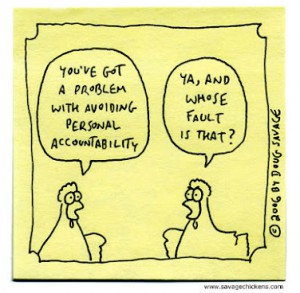toxic patterns in relationships

It’s natural for people to enter couples therapy or marriage counseling with very strong thoughts and feelings about what their partner or spouse is doing ‘wrong.’ This is one way that human beings react to the very deep pain that results from conflict/tension in relationships: we blame the other.
Thus, at some point during relationship therapy, I’ll sometimes find myself saying: “Just to be clear—the problem is NOT your partner.” And lest the person misinterpret my point, I follow it with: “And it’s not you either.”
it takes two
The problems that plague couples in relationships are what I refer to as ‘toxic patterns’—those self-defeating patterns of communication, emotion and behavior that human beings fall into and perpetuate together. The eminent couples therapist Sue Johnson refers to it as ‘the dance,’ which highlights that each partner plays his/her part in creating and/or maintaining the unfriendly or tension-filled relational environment.
Do ALL couples have toxic patterns?
Not really.
What I mean is—yes, all couples get into spats that involve being hurtful to each other. And whether the topic at hand is sex, money, division of labor, in-laws or something else—the point is that these interactions are, let’s say, non-constructive. However, many couples are regularly able to de-escalate these conflicts and re-connect long before the tension accrues momentum. Couples who are not able to neutralize the negativity develop toxic patterns which, over time, threaten the relationship.
How do I know if my partner and I have progressed from normal spats into toxic patterns?
Such patterns can be said to exist when: (1) the hurtful exchanges occur fairly often; (2) attempts to re-connect fail more than they succeed; (3) the emotional fall-out lasts for longer and longer intervals; (4) the feelings of anger/resentment are becoming the norm.
changing toxic patterns
Ideally, both partners ‘see’ the problems, ‘see’ their part in it and want to do the necessary work to make things better. Clearly, this is not always the case.
So what can I do if my partner continues to blame me and is less than enthusiastic about looking at his/her part?
Of course there is no guarantee that making positive changes in your own perspective, attitude and behavior will improve the relationship—but stepping up your game in this way will give you an indication as to whether your partner is willing to meet you halfway. If he/she is not interested in doing the work, if he/she repeatedly exhibits resistance to repairing/growing/deepening the relationship, then you have some choices to make.
But before you start considering ultimatums, you have some work to do.
The truth is that each of us plays a very significant role in shaping the quality and dynamics of our relationships—day in and day out. No matter what our partners do or don’t do, we are still responsible for how we react, what we do with our feelings, how clear/honest/direct we are being in our communications and so much more.
Complaining about our partners is the opposite of cleaning our own side of the street.
cleaning your own side of the street
So ask yourself:
|
To state the obvious, relationships are complex and messy, and they require that we learn and grow throughout life. None of us do it perfectly or get it right as often as we’d like. That said, we can derive enormous satisfaction and deep joy from a relationship that is intimate, connected and generally healthy. If you want that in your life then cleaning your side of the street on a regular basis is a good place to start.